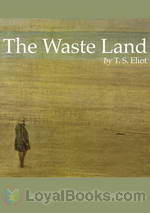

One Michigander posted on Facebook that Lightfoot's death made her sad, "mostly because a teenaged boyfriend once sang his songs to me.Eliot even refers to one of the battles from the Punic Wars, the Battle of Mylae, in the ‘Stetson’ section towards the end of ‘The Burial of the Dead’. One fan recalled meeting the celebrity, who tended to shun the spotlight, at the Royal Oak Music Theater and other venues. Lightfoot, Michiganders said, captured deep emotions and brought stories to life. Some said Lightfoot was their favorite singer. One father noted on social media early Tuesday that if not for Lightfoot neither of his daughters would remember the Fitz each November, and recalled the many road trips they took "singing together every word" of Lightfoot's song, even if a few things in it weren't quite right. 1 in Great Lakes cities" and released as a single. Yet, as a result of the one song that listeners wanted to hear over and over, the album was "No. The song - more than six minutes, about twice as long as most pop tunes - was "an unlikely hit" and "one of the top records on AM radio," a Free Press report published on Sept. 10 on Lake Superior and was later found hundreds of feet underwater. Stories about the Great Lakes freighter Edmund Fitzgerald were on the front page of Detroit Free Press' Nov. Although, in one of the few details that the song got wrong, it noted instead that the ship was bound "fully loaded for Cleveland." It faithfully recounted the freighter's tragic, final voyage as it got caught in a storm while heading to Detroit. However, the "Edmund Fitzgerald" song, while also about loss, quickly became popular. More: The 5 best Gordon Lightfoot songs from the late singer-songwriter's amazing career Social media tributes interview, Lightfoot speculated the stations feared it would spur violence, but, he said, it wasn't a controversial song to him at all. More than 40 people died, and some radio stations considered it too upsetting to broadcast. The singer later said it was one of his proudest works.Īnother Lightfoot song, "Black Say in July," was about the Detroit race riots - or what some term a rebellion - in 1967.

Eliot's poem "The Waste Land," and Lightfoot turned the first few lines into a song.

10, 1975 sinking in a Newsweek magazine article, "The Cruelest Month." The article's title was an allusion to T.S. Lightfoot, who sailed in the Mackinac Yacht Races, reportedly read about the Nov.


 0 kommentar(er)
0 kommentar(er)
